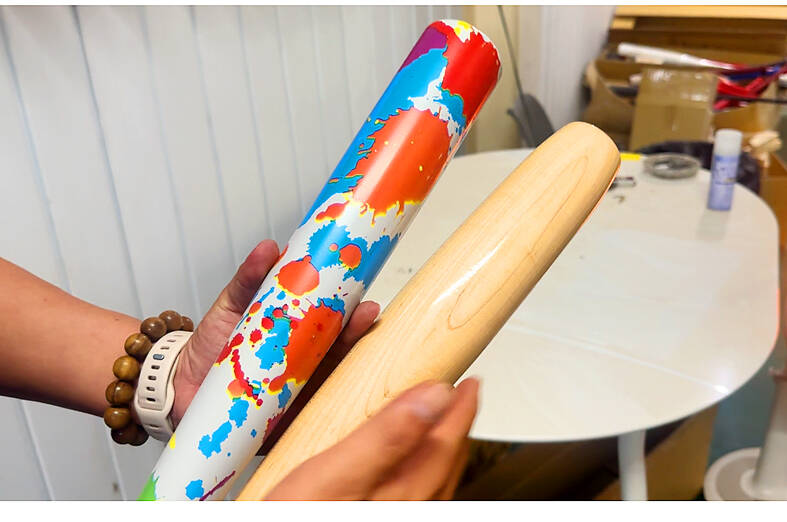The torpedo bat is likely to make its debut in Taiwan’s CPBL sooner than expected after the baseball league announced a way for certified bat providers to quickly get new types of bats into the hands of players.
Under a new league rule announced on Friday, once a bat brand is certified by the league, it could add new types of bats to its product list simply by submitting two samples of each type to the CPBL, the league said.
The new bats do not have to be individually tested, and the list can be updated once a year, it added.

Photo: CNA
That means that if any of the 20 certified bat producers present a torpedo bat sample to the league, it could enter service rather quickly.
Torpedo bats could make their CPBL debut as soon as Monday, the league said.
The move comes amid heightened interest among CPBL players in experimenting with the so-called torpedo bat, a design that has sparked considerable debate in Major League Baseball (MLB) in the US.
The New York Yankees put the torpedo bats in the spotlight when most of the team’s players used them to hit 15 home runs and score 36 runs in their season-opening three-game series against the Milwaukee Brewers.
The jury is still out on how much the bats really help. Yankees shortshop Anthony Volpe, who hit four home runs in the first five games of this year using the new equipment, still has four home runs 20 games into the season and is hitting .197.
Unlike standard bats, which distribute mass evenly throughout the barrel, torpedo bats concentrate their mass closer to the batter’s arms, specifically targeting the sweet spot, while fully complying with MLB regulations governing bat specifications.
Several CPBL players, including last year’s CPBL Taiwan Series MVP Tseng Song-en (曾頌恩) of the CTBC Brothers and last year’s WBSC Premier12 MVP Chen Chieh-hsien (陳傑憲) of the Uni-President 7-Eleven Lions, have provided positive feedback after testing the unconventional bats.
The impact of the torpedo bats on game dynamics and player health remains uncertain.

The Coast Guard Administration (CGA) yesterday said it had deployed patrol vessels to expel a China Coast Guard ship and a Chinese fishing boat near Pratas Island (Dongsha Island, 東沙群島) in the South China Sea. The China Coast Guard vessel was 28 nautical miles (52km) northeast of Pratas at 6:15am on Thursday, approaching the island’s restricted waters, which extend 24 nautical miles from its shoreline, the CGA’s Dongsha-Nansha Branch said in a statement. The Tainan, a 2,000-tonne cutter, was deployed by the CGA to shadow the Chinese ship, which left the area at 2:39pm on Friday, the statement said. At 6:31pm on Friday,

The Chinese People’s Liberation Army Navy’s (PLAN) third aircraft carrier, the Fujian, would pose a steep challenge to Taiwan’s ability to defend itself against a full-scale invasion, a defense expert said yesterday. Institute of National Defense and Security Research analyst Chieh Chung (揭仲) made the comment hours after the PLAN confirmed the carrier recently passed through the Taiwan Strait to conduct “scientific research tests and training missions” in the South China Sea. China has two carriers in operation — the Liaoning and the Shandong — with the Fujian undergoing sea trials. Although the PLAN needs time to train the Fujian’s air wing and

Taiwanese celebrities Hank Chen (陳漢典) and Lulu Huang (黃路梓茵) announced yesterday that they are planning to marry. Huang announced and posted photos of their engagement to her social media pages yesterday morning, joking that the pair were not just doing marketing for a new show, but “really getting married.” “We’ve decided to spend all of our future happy and hilarious moments together,” she wrote. The announcement, which was later confirmed by the talent agency they share, appeared to come as a surprise even to those around them, with veteran TV host Jacky Wu (吳宗憲) saying he was “totally taken aback” by the news. Huang,

The American Institute in Taiwan (AIT) put Taiwan in danger, Ma Ying-jeou Foundation director Hsiao Hsu-tsen (蕭旭岑) said yesterday, hours after the de facto US embassy said that Beijing had misinterpreted World War II-era documents to isolate Taiwan. The AIT’s comments harmed the Republic of China’s (ROC) national interests and contradicted a part of the “six assurances” stipulating that the US would not change its official position on Taiwan’s sovereignty, Hsiao said. The “six assurances,” which were given by then-US president Ronald Reagan to Taiwan in 1982, say that Washington would not set a date for ending arm sales to Taiwan, consult